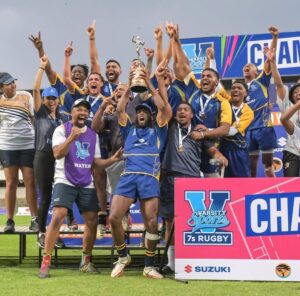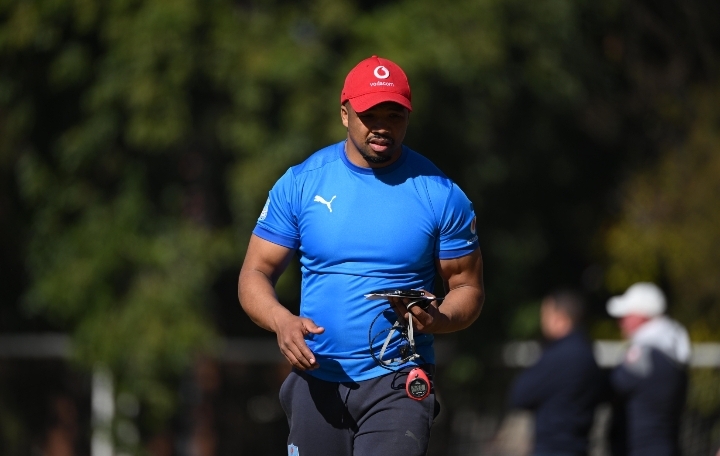Bernado Botha, a graduate of our BSc in Strength & Conditioning, is S&C coach with the Vodacom Bulls Currie Cup team. Below, Bernardo shares his insights from transitioning to the world of S&C from his rugby playing career.
Rugby Beginnings
Bernado’s rugby journey began at the age of 16 when he moved to Johannesburg to pursue his dream of playing rugby. “I moved to Johannesburg at the at 16 years to pursue my rugby career at the Golden Rugby Union and since then I have been involved in many teams which helped me to shape myself as a human and professional athlete. I am grateful to have travelled across the globe which led me to explore great high-performance facilities and environments,” he shared.
Over the years, he has played for various teams, gaining exposure to high-performance environments across the globe. “I was fortunate enough to work with some of the best professional coaches throughout my career—they inspired me to develop my full potential.
Rugby has given so much to me, and I just want to create an environment where athletes can reach their goals in life but also be better human beings,” he explained.
From Rugby to Coaching
Bernado credits his rugby career with heavily influencing his decision to become an S&C coach. “Without a doubt, I think my career played a massive role in my decision to be a S&C Coach,” he said. As a player, Bernado relied on conditioning to give him an edge. “I wasn’t the most skillful player in my teams, and therefore I had to thrive on my conditioning throughout,” he admitted. His commitment to fitness paid off, minimising his injury risk and allowing him to maintain peak performance. “I saw it helped me not just to give me the edge over other players but also to have minimum injury risk. Throughout my 13-year career, I only suffered from 2 major injuries where I needed surgeries at almost the end of my career,” he added.
Now, he is the Strength and Conditioning Coach for the Vodacom Bulls Currie Cup senior team. “My main role is to develop players to last the whole season, keeping them injury-free so they can execute rugby-specific skills under pressure,” he explained. His responsibilities include delivering conditioning programs, working with the multidisciplinary performance management team, and ensuring training sessions run smoothly.
Bernado outlined how his playing days have influenced his coaching methods. “The biggest lesson I learned was to be prepared for the pros and cons of everything. Adaptability plays a big role in winning small margins, especially when unexpected scenarios happen,” he shared.
 Coaching Philosophy
Coaching Philosophy
“I’m the first person in the gym to open up for players and the last to leave, ensuring the facility is clean and tidy,” he shared. His mornings involve preparing warm-up equipment and drills before overseeing gym and field sessions. After sessions, Bernado takes time to connect with players and management to gather feedback and improve future plans. “Being proactive and planning for the next session is crucial,” he emphasised.
Bernado’s coaching philosophy centers on the idea of “Human before athlete.” He explained, “I firmly believe if you get the best out of the human being first, the athletic part will follow automatically with the right discipline and dedication to their grit.”
When working with younger or less experienced players, Bernado focuses on building foundational skills and injury prevention. “Less experienced players prioritise building foundational skills, general fitness, and injury prevention through proper technique, bodyweight exercises, and gradual progression in intensity. It focuses on aerobic development, basic strength, mobility, and integrating skills with simple decision-making drills. In contrast, seasoned players engage in advanced, sport-specific conditioning, including explosive power, anaerobic capacity, and high-intensity interval training to mimic game demands. They also focus on refining mechanics, addressing known weaknesses, and optimizing recovery. The approach for younger players emphasises confidence-building and fundamentals, while seasoned players require targeted, performance-driven strategies.”
Why Setanta College?
After retiring from professional rugby, Bernado turned his focus to education. “My late brother always wanted me to study and become something for when my rugby career ended,” he shared. “The programme feels tailor-made for me. It allows me to learn and implement what I’ve learned in my everyday work,” he said.
“The flexibility of the program, combined with the technical and interpersonal skills I’ve gained, makes it an ideal choice,” he noted. “The most beneficial part has been learning new things every day and applying them in my role.”
Looking Ahead
For those starting their careers in S&C, Bernado outlines “Be open to absorbing information and experiences from the environments you’re in. Be a sponge.”


Leave A Comment